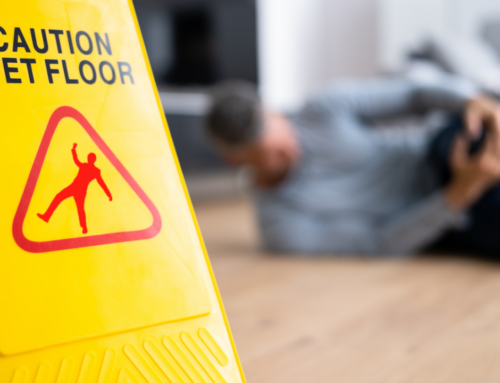When you place your loved one in a nursing home, you trust the facility to provide safe and attentive care. Unfortunately, accidents such as falls can still occur, often due to inadequate supervision, unsafe conditions, or even neglect. These incidents can lead to serious injuries, emotional distress, and, in some cases, lasting harm to your loved one’s health and quality of life. If your loved one has experienced a fall in a nursing home, it’s essential to know the right steps to take to protect their health and legal rights. This guide will provide a comprehensive overview of the actions you should take, as well as how to recognize signs of negligence and what legal recourse you may have.
Seek Immediate Medical Attention
Your loved one’s health and well-being are your top priorities after a fall. Even if they appear uninjured, falls can result in hidden or internal injuries that are not immediately apparent. Acting quickly can make a significant difference in their recovery. Here’s what you should do:
Assess the Situation
First, assess the situation as calmly as possible. If your loved one is conscious and able to communicate, ask them about their pain or discomfort. Look for visible signs of injury such as bruising, cuts, swelling, or difficulty moving. If they are unconscious or unable to respond, proceed with extreme caution to avoid causing further injury.
Notify the Nursing Home Staff
Inform the nursing home staff immediately about the fall and your loved one’s condition. The staff should promptly call for a qualified healthcare professional to assess the severity of the injuries. Insist that the staff take vital signs and perform a thorough medical evaluation to rule out any internal injuries.
Seek External Medical Help
If the nursing home staff does not take immediate action or if you believe the injuries require urgent medical attention, call emergency services or take your loved one to the nearest hospital. Trust your instincts as a family member; you know your loved one’s normal behavior and physical capabilities better than anyone. Don’t hesitate to seek external medical assistance if you feel the nursing home isn’t responding appropriately.
Document the Incident
Proper documentation is crucial for any potential legal action and to ensure a thorough investigation by the nursing home. It can also serve as an essential record for medical treatment and follow-up care. Here’s how to document the incident effectively:
Take Photographs
Photographs can serve as powerful evidence if legal action is necessary. Take clear, well-lit pictures of any visible injuries, such as bruises, cuts, or swelling. Capture images from multiple angles to provide a comprehensive view of the injuries. Additionally, take photos of the scene where the fall occurred, including any hazards or unsafe conditions such as wet floors, poor lighting, or lack of handrails that may have contributed to the incident.
Gather Witness Statements
If there were any witnesses to the fall, including other residents, staff members, or visitors, speak to them and ask for their accounts of the incident. Request their contact information so your nursing home abuse lawyer can follow up with them later. Witness statements can provide crucial details and corroborate your account of the incident.
Keep Medical Records
Maintain a comprehensive file of all medical records related to the fall, including hospital visits, doctor appointments, and any treatments or medications prescribed. These records can be invaluable for proving the extent of your loved one’s injuries and the impact on their health. Additionally, keep track of any expenses related to these medical treatments, including transportation to medical appointments and any necessary medical equipment or home care services.
Maintain a Journal
Keep a detailed journal of your interactions with the nursing home administration and staff. Note any concerns or issues you’ve raised, along with their responses. This journal can help establish a timeline of events and show whether there was a pattern of negligence. Include dates, times, and names of the individuals you spoke with, as well as the content of the conversations. This documentation can be a critical piece of evidence if legal action becomes necessary.
Report the Incident to the Nursing Home
Once you’ve documented the incident, it’s essential to report the fall to the nursing home administration. Doing so serves as an official notification and puts the facility on notice about the incident. When reporting the incident, make sure to include the following information:
Provide Specific Details
Be as specific as possible when reporting the fall. Include the date, time, and location of the incident, as well as any environmental factors or conditions that may have contributed to the fall, such as wet floors, poor lighting, or lack of handrails. A detailed account will help the nursing home administration understand the severity of the situation.
Describe the Injuries
Explain the injuries sustained by your loved one due to the fall. Include any medical records, photographs, and witness statements that support your claims. Be thorough in describing the physical and emotional impact of the injuries on your loved one’s daily life and overall well-being.
Mention Previous Concerns
If you’ve previously expressed concerns about your loved one’s safety or care, include this information in your report. It helps establish a pattern of negligence and demonstrates that the nursing home was aware of potential risks. Document any previous incidents or complaints you have made and the responses or actions taken by the nursing home staff.
Request for Action
Clearly state that you expect the nursing home to investigate the incident thoroughly, take appropriate action to prevent similar incidents, and provide regular updates on their investigation. Specify any immediate steps you believe they should take to ensure your loved one’s safety and well-being, such as additional supervision or environmental modifications.
Recognize the Signs of Nursing Home Negligence
Falls can sometimes be an indicator of broader issues of negligence or abuse in a nursing home. It’s crucial to be aware of the signs of negligence, which can include:
Inadequate Supervision
A lack of staff presence, especially in areas where falls are more likely to occur, such as bathrooms or hallways, can indicate inadequate supervision. When facilities are understaffed, vulnerable residents may be left without the necessary assistance, increasing the likelihood of accidents.
Unsafe Conditions
Environmental hazards like wet floors, poor lighting, or lack of handrails can increase the risk of falls. Cluttered walkways, loose carpeting, and poorly maintained equipment can also pose significant dangers to residents.
Neglectful Care
Failure to assist residents with mobility issues, providing the necessary medical devices or medications, or properly addressing their individual needs can lead to disaster. Signs of neglect may also include poor personal hygiene of residents, unexplained injuries, or sudden weight loss.
Poor Training or Understaffing
Insufficient training and insufficient staff can contribute to an inadequate level of care and supervision. High staff turnover rates can also indicate a problematic environment where caregivers don’t have adequate support or aren’t prepared to handle the demands of their roles.
Emotional and Behavioral Changes
Noticeable changes in a resident’s behavior, such as increased anxiety, depression, or withdrawal, can also be indicators of neglect or abuse. Pay attention to how your loved one interacts with the staff and other residents and any reluctance to speak about their experiences.
If you notice any of these signs, please don’t hesitate to address them with the nursing home administration and consider speaking with a lawyer. Regular visits and open communication with both your loved one and the caregiving staff can help you stay informed about their care and quickly identify any potential issues.
Contact a Nursing Home Abuse Lawyer
If you suspect negligence or abuse contributed to your loved one’s fall, it’s essential to consult with an experienced nursing home abuse lawyer. A lawyer can help you navigate the complex legal process and provide the necessary guidance to seek justice for your loved one. Here’s why it’s crucial to seek legal representation:
Extensive Knowledge in the Field
Nursing home lawyers have a deep understanding of the laws and regulations governing nursing home care. They know how to identify and address instances of negligence or abuse effectively. This knowledge allows them to build a strong case that accurately reflects the severity of the situation.
Investigation and Evidence Gathering
Your lawyer will thoroughly investigate the incident. They’ll gather evidence, interview witnesses, and consult with experts to build a convincing case for compensation. A skilled lawyer won’t overlook any detail. They’ll also present all evidence in the most compelling manner possible.
Negotiation and Settlement
A nursing home attorney can negotiate with the nursing home or their insurance company to secure a fair settlement for your loved one’s injuries and damages. They’re skilled in negotiating terms that reflect the full extent of the harm suffered and your loved one’s future care needs.
Court Representation
If the case goes to court, your attorney will provide skilled representation to fight for your loved one’s rights and seek the compensation they deserve. They’ll present your case with experience, supporting all their legal arguments with solid evidence.
Emotional Support
Dealing with your loved one’s fall in a nursing home can be emotionally draining. A nursing home attorney can provide compassionate support and guidance throughout the process, alleviating many of your burdens. They understand the emotional toll such incidents can take and are committed to helping ensure justice and peace of mind.
File a Lawsuit to Seek Compensation
If the nursing home’s negligence caused the fall, filing a lawsuit might be necessary to seek justice and compensation. Here are some key points to consider:
The Statute of Limitations
Be aware of the statute of limitations for filing a lawsuit in your state. This is the time limit within which you and your lawyer must take legal action. If the statute expires, you won’t have any other legal options.
Evidence Collection
Collect and preserve all the evidence related to the incident, including medical records, photographs, witness statements, and any correspondence with the nursing home. Your lawyer will need this information to build a strong case.
Expert Witnesses
In some cases, expert witnesses may be needed to testify about the standard of care in the nursing home and whether it was violated. Expert witnesses can include medical professionals, nursing home industry experts, or others with specialized knowledge relevant to the case. Their testimony can be crucial in proving negligence or abuse.
Compensation
If your lawsuit is successful, you may be entitled to various forms of compensation, including:
- Medical Expenses: This includes the cost of treating the injuries sustained in the fall, as well as any future medical expenses related to ongoing care or rehabilitation.
- Pain and Suffering: Compensation for the physical pain and emotional distress your loved one experienced as a result of the fall.
- Loss of Quality of Life: If the fall has severely impacted your loved one’s ability to enjoy life or perform daily activities, compensation may be awarded for the loss of quality of life.
- Punitive Damages: In cases of egregious negligence or abuse, punitive damages may be awarded to punish the nursing home and deter similar behavior in the future.
Your attorney will help determine the appropriate amount of compensation to seek based on the circumstances of your case.
Take Steps to Prevent Future Incidents
Once you have addressed the immediate concerns following a fall, it’s essential to take steps to prevent future incidents. While no one can guarantee that accidents will never happen, there are several proactive measures you can take to help safeguard your loved one’s well-being:
Communicate with the Nursing Home
Maintain regular communication with the nursing home staff and administration. Attend care plan meetings and ask questions about your loved one’s safety and care protocols. Address any concerns promptly and follow up to ensure they have been resolved.
Visit Frequently
Frequent visits allow you to monitor your loved one’s condition and the care they are receiving. It also gives you an opportunity to observe the facility’s environment and identify potential safety hazards.
Advocate for Proper Care
Ensure that the nursing home is providing appropriate care for your loved one’s specific needs. This may include adequate supervision, assistance with mobility, or any necessary medical equipment. Be vocal about your expectations and advocate for your loved one’s right to safe and respectful care.
Consider Alternative Care Options
If you have ongoing concerns about the quality of care or the safety of the nursing home environment, you may need to consider alternative care options. This could include transferring your loved one to a different facility or exploring in-home care services if feasible.
A fall in a nursing home can be a traumatic experience for both the resident and their family. Understanding the steps to take afterward can help ensure that your loved one receives the care and support they need and that any underlying issues of negligence are addressed. Immediate medical attention, thorough documentation, and reporting the incident are crucial first steps. Recognizing signs of negligence and seeking legal counsel from a West Palm Beach nursing home abuse lawyer can help you navigate the complexities of the situation and seek justice for your loved one.
Taking proactive measures to prevent future incidents is also essential. Regular communication with the nursing home, frequent visits, and advocacy for proper care can help protect your loved one from further harm. If you suspect that negligence or abuse played a role in your loved one’s fall, don’t hesitate to take legal action. Holding the responsible parties accountable can not only provide compensation for your loved one’s suffering but also help prevent similar incidents from happening to others.
Above all, remember that you have the right to expect safe, compassionate care for your loved one. If that expectation is not being met, you have the right to take action to protect their well-being and dignity.






